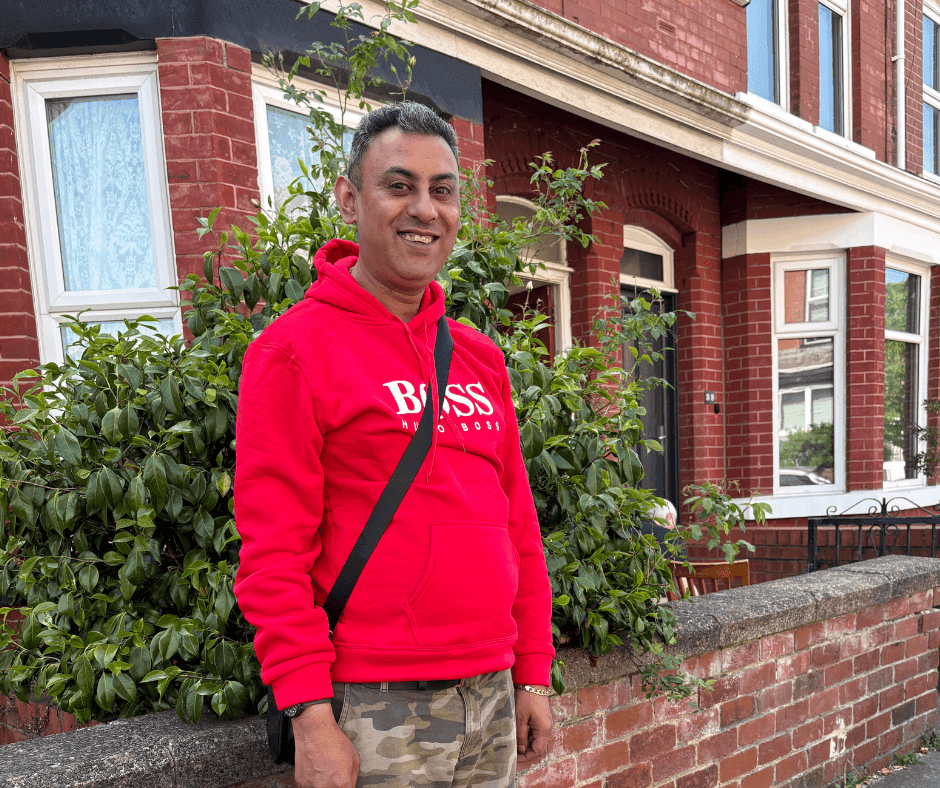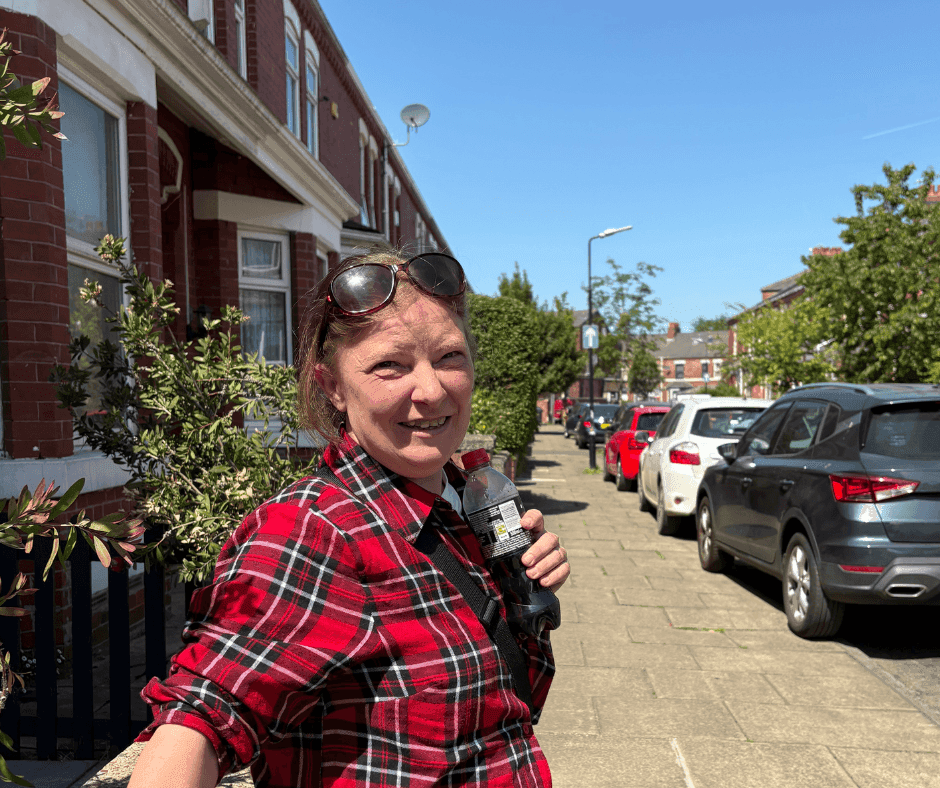Supported Living

Passionate about empowering people to live well in their own homes, connected to their communities, our Supported Living teams enable people with additional needs to thrive at home.
Why choose Cera Supported Living?
With our person-centred, strengths-based approach, we are ideally placed to support people with a wide range of needs to live healthy, safe, and enriching lives at home. We are experienced in supporting people with physical health conditions and disabilities, mental health needs, Learning Disabilities, and complex needs to develop living skills, access their communities, and maintain their homes.
**We achieve this through: **
- Getting to know the customer through a multidisciplinary approach, involving their circle of support (friends, family) and any linked professionals, to help us see the big picture of their life. Our Family App enables instant, continuous communication and monitoring of the visit notes, health, and Care Plans of each customer.
- A tailored, assets and strengths-based approach to each person’s care.
- Finding out what is important to our clients and building personal outcomes to collaboratively work towards, with progress recorded on our in-house designed Outcomes Tool. Our Tool encourages our customers to break their long-term outcomes down into achievable goals, helping them to feel a sense of achievement and building confidence.
- Our well-trained, skilled Support Workers, recruited for their values and experience, who are assigned into small teams matched to our customers.
- A bespoke induction and ongoing training programme, delivered and monitored by our dedicated Training Team, with additional access to over 350+ e-learnings for staff development.
We deliver a wide range of support, including:
- All aspects of personal care, delivered in line with the client’s wishes and privacy and dignity standards.
- Medication administration and ordering, made more efficient and accurate through our use of eMARs.
- A daily health review and ongoing support with hydration and nutrition, through our Cera Care App, which flags issues, enabling early intervention.
- Enabling access to the local community, building friendships and relationships outside the house. We work closely with local services and community groups to know where our clients can find services they need, or places that match their interests.
- Life skills, including budgeting, cooking, and maintaining a household.

Helen's Story
Helen has been with the scheme since 2010 and has shown remarkable progress, building a positive rapport with her care team. Helen participates in activities such as art classes, pottery, and baking. She also enrolled at college and achieved maths and English qualifications.
Helen’s experience demonstrates the impact of personalised approaches in mental health support and the potential for recovery and growth, even in the face of significant adversity. Her transformation underscores the importance of understanding and addressing trauma.
With ongoing support Helen has reconnected with her family and is leading a fulfilling life - a testament to her own resilience and the power of dedicated care.
Case Studies
Mental Health Support
“Hilary”, a customer with a mental health diagnosis, began to experience a significant decline in her mental and physical health. Hilary decided not to take her medication, and was not eating or drinking properly. This led to difficulty sleeping and weight loss, which caused a further decline in her mental health, including suicidal thoughts. Hilary exhibited signs of self-harm and substance misuse (alcohol), as well as being a heavy smoker.
During a stay in hospital, Hilary’s mental state was so precarious that she attempted to jump out of a window, necessitating the installation of a window stopper for her safety.
In order to successfully address Hilary’s complex needs, we adopted a collaborative, joined up approach, working closely with other professionals, including her GP, the mental health team, a dietician, and her next of kin to provide informed, person-centred support.
This included: Regular multidisciplinary meetings, to co-ordinate care strategies and ensure all parties involved understood their role and responsibilities in Hilary’s care. Removing potentially harmful objects from Hilary’s flat (done by her next of kin). A GP assessment to confirm Hilary’s capacity (refusal of medication) under the Mental Capacity Act. Continuous review and adaptation of Hilary’s Support Plan and hours. Referral to a dietician for prescribed supplement drinks and fortified food recommendations.
We implemented additional wellbeing checks for Hilary (in the evening) to offer encouragement, company, and reassurance. We also recruited and assigned a staff member to Hilary who was fluent in French (her first language), to better support her and build rapport.
Our Registered Manager and Care Co-ordinator visited her regularly (2-3 times a week), to develop a trusting relationship with Hilary.
Eventually, over time, with the introduction of the support above, Hilary began to engage with our Care team. This led to her opening up to her Support Workers about her past history and her faith (which is of great importance to her). We requested a (granted) increase in Care hours for her so that our Support Workers could accompany her to her place of worship, and to access the community. Hilary declined support from the Alcohol Support Team, but has successfully given up smoking, with the help of nicotine patches and encouragement.
Making a Difference
Our team has been supporting “Ian”, a young man with an Acquired Brain Injury since 2008. Ian was told that he would never walk, and a tracking hoist, and other equipment was installed in his home.
His mum always believed that he would walk one day, and she bought a multigym for the house, and encouraged Ian to use the equipment. Ian was getting bored of the home gym, but his family could see that it was making a difference.
In 2008, when we started working with Ian and his family, one of Ian’s desired outcomes was to improve his mobility. As he was bored of exercising at home, we found a local gym which was able to support Ian’s needs.
Our team initially accompanied him to the gym twice a week, pre-booking a disabled taxi. However, as Ian was really pushing himself, and was determined to get stronger, we agreed to support him to the gym daily. As he has a competitive side, our team had to be prepared to workout alongside him!
Thanks to his dedication (and hard work in the gym from our team too!) Ian can walk with a frame, and get in and out of a car with little assistance. He can also shower and change in the gym with almost no assistance.
Building on this success, Ian wanted to try swimming. We co-produced a risk assessment, involving Ian, his family, his medical professionals, and the swimming pool, and Ian now swims twice a week.
The staff here are really helpful and supportive. I just want to say thank you to all the staff that have supported me through a rough time.
Helen, Supported Living Client, Manchester
Case Studies
A Place to Call Home
Everyone should have the opportunity to decide where to live, and who they want to live with. We ensure that the control over this decision rests with our clients, making sure that their voices are heard.
One of our teams has a strong working relationship with 4 people living together in the same property, all needing additional support with their mental health. After living in the property for many years, their landlord gave 3 months’ notice as they wished to sell.
This was very distressing for these clients, and so our team sat with them to understand what they wanted to happen next - to stay together. When other, separate housing options were suggested, our team was there to advocate for, and encourage our clients to speak up. We held meetings with the necessary Adult Social Care workers, and identified 3 local properties which would meet the needs of these clients.
The clients chose one of these properties, which needed work done, and so we arranged for meetings between the housing provider and our clients to discuss the changes needed - and the redecoration to make it feel like home. A shed was of great importance to these clients, and so we arranged to have one built.
All four clients transitioned smoothly, into a property they chose, re-decorated to their specifications, and with the people they wanted to live with.
Thank you for making my dreams come true.
'Phillip' Supported Living Client
Enriching Lives
Our long-standing client “Lizzie” has had a fear of all things around her, people, open spaces, and going out doors (Agoraphobia). Having supported her since 2016, our team has worked with her, her mental health needs and mild Learning Disability to lessen the impact of her fears on her daily life.
We have built a trusting relationship with Lizzie, through a small, core care team, which is essential to managing her anxiety, as she knows who is coming to her door.
Over time, we were able to encourage Lizzie to step out of her front door, and eventually walk to the end of her street. Realising that, once she overcame her fears, she actually enjoyed being outdoors and loved animals, our team worked with Lizzie to build up to taking short trips (in a carer’s car) to the countryside. This has been a resounding success for Lizzie, whose life has broadened remarkably thanks to her bravery and the patience of her team.
Supporting Through Difficult Times
Our teams are adept at supporting clients through difficult times in their lives, through an understanding and empathetic approach, which recognises clients’ additional needs.
“Phillip” had been happy living in Supported Living with his co-tenant and friend “Mark”, until Mark passed away suddenly. Due to the shock, Phillip struggled with his grief and turned to negative outlets to cope.
Another co-tenant moved into the property, but Phillip, still finding his grief understandably challenging, found this transition difficult, and began to spend a lot of time away from home, withdrawing from our team. This was easier for him than trying to work through his grief and accept the loss of Mark.
Our team spent time with Phillip, to understand how he was feeling, and how they could make him feel more comfortable at home, liaising with his new co-tenant around meaningful activities they might both enjoy.
With our empathetic support, Phillip took steps to lead a healthier lifestyle again by looking after himself, while making an effort to get to know his new co-tenant.
As he began to enjoy life again, Phillip asked our team if they could accompany him on holiday for the first time, to see his favourite football team’s home city.
We worked with Phillip to design the holiday he wanted (place, length of stay, activities), and our team added in a few surprises which would make it even more special. His football shirt was old and worn, so we bought him a brand new one, to look smart for his holiday. On the day of his arrival, we had arranged for Phillip to have a tour of the football grounds and the museum. Phillip was ecstatic, as he never thought he would have the chance to visit the ground where his football team plays. We “made (his) dreams come true”!
As well as visiting the hallowed football grounds, Phillip explored the city and watched live entertainment in the evenings. Our team took lots of photos, making an album for Phillip to look back on whenever he felt sad.
On returning home, Phillip was the happiest anyone had ever seen him, thanking everyone for making it possible. He is now wanting to plan another trip away with the team for the end of the year as he wants something amazing to look forward to again.
Through their connection with Phillip, our team were able to build him back up from a low point in his life, remembering his friend Mark, but continuing to live his life too.